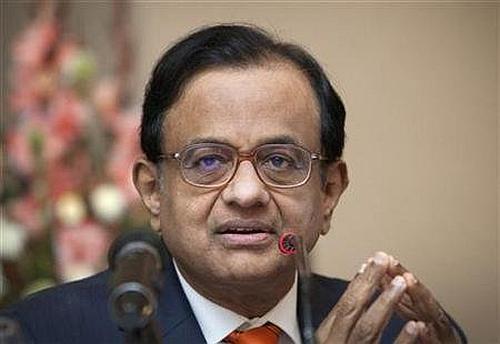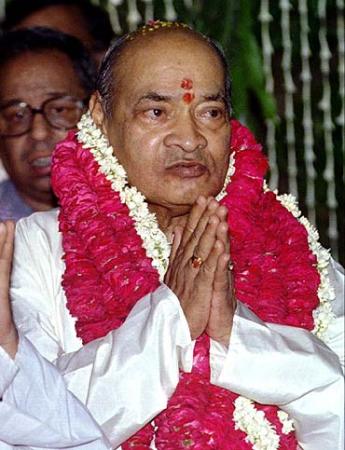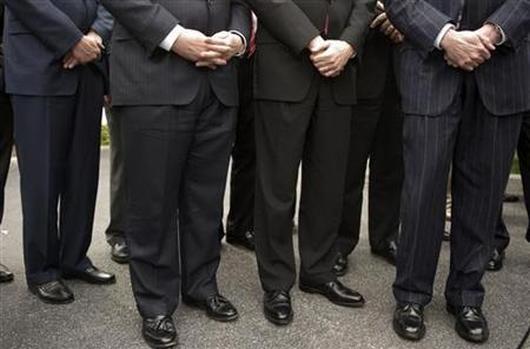Photographs: Faisal Mahmood/Reuters Nitin Pai
India needs administrative reforms that make it easy for investors to do business in the country. Currently, it is more difficult to do business in India than in Rwanda, Pakistan, Nepal, Kenya, Nigeria and Bangladesh.
Union Finance Minister P Chidambaram is heading to Singapore later this week to persuade investors that India has discarded foolish economic policies.
Mr Chidambaram embarked on a similar expedition 22 years ago, when as minister of state for commerce in the P V Narasimha Rao government, he accompanied Manmohan Singh, then finance minister, to address a seminar on "Investing in India: New Business Opportunities".
Their mission was to convince the audience that India's commitment to liberalisation was real, that the economy was open to the world for business, and that the government would stop getting in the way.
Old hands at the Indian High Commission in Singapore recall that Dr Singh and Mr Chidambaram rocked the old World Trade Centre auditorium that day in October 1991.
Many of the big projects that emerged out of those deliberations, such as the Madras Corridor and the Tata-Singapore Airlines joint venture, didn't take off. Some, such as Bangalore's Information Technology Park, did.
The measure of that trip is not the success of specific projects and business deals. It is in the performance of the Indian economy since then.
...
Some truths investors won't tell FM on his Singapore trip
Image: P V Narasimha Rao was India's prime minister from 1991 to 1996.Photographs: Reuters
High-level policy communication is necessary, but it is not a substitute for policy credibility.
Mr Chidambaram's 1991 trip to Singapore succeeded not because he charmed the audience - he "wowed Singapore's gold-collared fraternity" according to an India Today report - but because the Narasimha Rao government held its ground against stiff internal opposition from within the Congress party.
Similarly, the finance minister's upcoming roadshows at Asian and European financial centres will have merely ephemeral effects unless the United Progressive Alliance government shows a similar determination to implement the recommendations of the Vijay Kelkar Committee on fiscal consolidation and the Parthasarathi Shome Committee on tax rules.
Retrospective taxation, for instance, remains a ghastly assault on basic principles of fair play and natural justice.
Mr Chidambaram might well be signalling the government's disinclination to pursue it by deferring its implementation to 2016, but unless he clears up the mess that his predecessor created, long-term investments of the kind that India needs will face disincentives.
Whatever effort the finance minister makes to attract foreign investment, avoid a ratings downgrade and improve that wondrous thing called sentiment is to be appreciated.
This does not mean that satisfying the current fashions, priorities and demands of investors alone will take the Indian economy out of the rut it has been thrust into.
For that, as my colleague V Anantha Nageswaran suggests, the answers lie in a different place: the World Bank's Doing Business index.
...
Some truths investors won't tell FM on his Singapore trip
Image: In World Bank's Doing Business index, India ranks 184 in contract enforcement and 182 in dealing with construction permits.Photographs: Mario Anzuoni/Reuters
Out of the 185 countries that the Doing Business index ranks in its latest compilation, India is at 132. It is more difficult to do business in India than in Rwanda, Serbia, Papua New Guinea, Pakistan, Nepal, Kenya, Nigeria and Bangladesh.
While India scores decently in sub-indices for access to credit and investor protection, its record is appalling in contract enforcement (rank 184) and dealing with construction permits (rank 182). India has done better in two of the 10 sub-indices, but fallen in six.
Contract enforcement costs are a drag on existing firms, resulting in a loss of economic value. If land acquisition remains a test of intergenerational determination, it is unlikely to appeal to people who prefer to live happy, healthy and honest lives.
According to National University of Singapore's Mukul Asher and Deepa Vasudevan, "rather than any single major reform; it is the cumulative impact of many small measures and professional attention to detail that will improve India's overall ranking".
Put differently, the economy is crying out for administrative reforms: address these and investment will take off.
As the Doing Business report argues, there is a correlation between a better ranking and greater flows of foreign direct investment, supporting "the claim that economies that provide a good regulatory environment for domestic firms tend to also provide a good one for foreign firms."
...
Some truths investors won't tell FM on his Singapore trip
Image: Chidambaram's audience will be receptive and sceptical of India at the same time.Photographs: Larry Downing/Reuters
The finance minister might not hear this from the assembly of international bankers he will meet. Yet this is really what he needs to hear.
Mr Chidambaram's 1991 trip occurred in the backdrop of the collapse of the Soviet Union, preparations for the exit of the US navy from its base in the Philippines and concerns over whether regional power rivalry will replace the years of stability in East Asia enjoyed until then.
There were concerns - most famously expressed by Singapore's then-prime minister Goh Chok Tong, about India's maritime power projection in the region.
Like Singapore, many of the small and medium powers of the region hoped that the Indian economy would grow, and in a manner that would allow them to benefit from it.
In 2013, Mr Chidambaram will arrive in Singapore and Hong Kong at a time when the risks of military conflict and economic readjustments are real in East Asia, and where domestic political transformations are apace.
Most countries in the region have an interest in an India that has regained its growth trajectory. Now, as then, Mr Chidambaram will be greeted by an audience that is receptive but sceptical as to whether India will really stop defeating itself.
The writer is founder and fellow of the Takshashila Institution, an independent public policy think tank






article